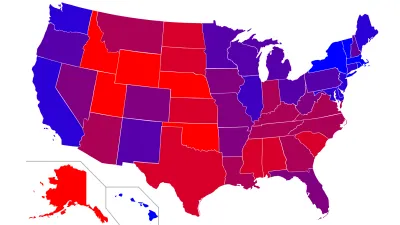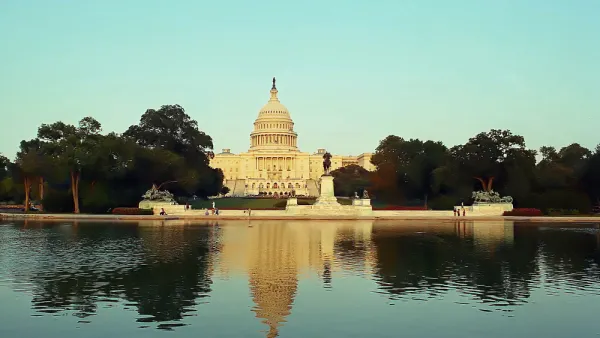When it comes to federal appropriations, urban areas in states dominated by rural Republicans are at a distinct disadvantage. In search of lobbying power, metros in affected states are banding together.

Alan Greenblatt makes the case that cities are hampered in states where legislators tend Republican: "[...] partisan divisions have become more aligned with regional ones. Most urban delegations are dominated by Democrats, while most rural and many suburban representatives are Republican."
Rural and suburban Congresspeople can get reelected by advancing an anti-urban agenda. "But the lack of urban voices within many majorities means cities are bound to lose out on some appropriations. 'When the urban economies are responsible for 70 percent of the state's revenue, you would think we would get more respect, but we don't,' says Oklahoma City Mayor Mick Cornett. 'In our state, it seems like the easiest way for a rural legislator to score points at home is to take a shot at Oklahoma City.'"
Strategies have arisen to reverse what might be called a self-destructive tendency. Greenblatt writes, "In response to this trend, major metropolitan areas in some states are forming alliances, hoping to speak collectively with a more powerful voice. In Kentucky, Louisville has joined with other sizable cities to form a 'metro alliance for growth.'" Solutions proposed include local tax measures and other decentralized means of raising money, independent of federal or even state control.
FULL STORY: In Red States, Cities Can’t Win

National Parks Layoffs Will Cause Communities to Lose Billions
Thousands of essential park workers were laid off this week, just before the busy spring break season.

Retro-silient?: America’s First “Eco-burb,” The Woodlands Turns 50
A master-planned community north of Houston offers lessons on green infrastructure and resilient design, but falls short of its founder’s lofty affordability and walkability goals.

Delivering for America Plan Will Downgrade Mail Service in at Least 49.5 Percent of Zip Codes
Republican and Democrat lawmakers criticize the plan for its disproportionate negative impact on rural communities.

Test News Post 1
This is a summary

Test News Headline 46
Test for the image on the front page.

Balancing Bombs and Butterflies: How the National Guard Protects a Rare Species
The National Guard at Fort Indiantown Gap uses GIS technology and land management strategies to balance military training with conservation efforts, ensuring the survival of the rare eastern regal fritillary butterfly.
Urban Design for Planners 1: Software Tools
This six-course series explores essential urban design concepts using open source software and equips planners with the tools they need to participate fully in the urban design process.
Planning for Universal Design
Learn the tools for implementing Universal Design in planning regulations.
EMC Planning Group, Inc.
Planetizen
Planetizen
Mpact (formerly Rail~Volution)
Great Falls Development Authority, Inc.
HUDs Office of Policy Development and Research
NYU Wagner Graduate School of Public Service




























